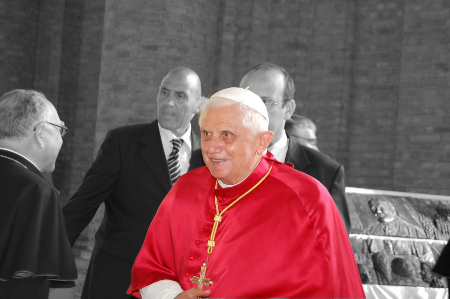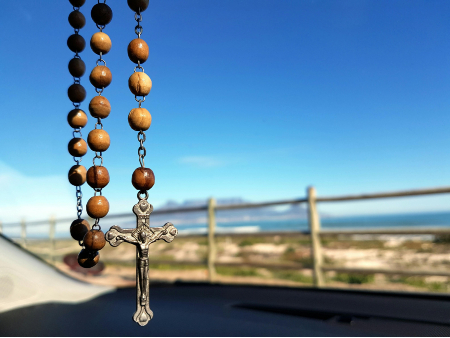We ask you, humbly: don't scroll away.
Hi readers, it seems you use Catholic Online a lot; that's great! It's a little awkward to ask, but we need your help. If you have already donated, we sincerely thank you. We're not salespeople, but we depend on donations averaging $14.76 and fewer than 1% of readers give. If you donate just $5.00, the price of your coffee, Catholic Online School could keep thriving. Thank you.Help Now >
Modern Aftermath of the Crusades
FREE Catholic Classes
Robert Spencer on the Battles Still Being Waged
WASHINGTON, D.C., MARCH 13, 2006 (Zenit) - The Crusades may be causing more devastation today than they ever did in the three centuries when most of them were fought, according to one expert.
Robert Spencer, author of "Politically Incorrect Guide to Islam (and the Crusades)", claims that the damage is not in terms of lives lost and property destroyed but is a more subtle destruction.
Spencer shared with us how false ideas about the Crusades are being used by extremists to foment hostility to the West today.
Q: The Crusades are often portrayed as a militarily offensive venture. Were they?
Spencer: No. Pope Urban II, who called for the First Crusade at the Council of Clermont in 1095, was calling for a defensive action -- one that was long overdue.
As he explained, he was calling the Crusade because without any defensive action, "the faithful of God will be much more widely attacked" by the Turks and other Muslim forces.
"For, as most of you have heard, the Turks and Arabs have attacked them and have conquered the territory of Romania [the Greek empire] as far west as the shore of the Mediterranean and the Hellespont, which is called the Arm of St. George," Pope Urban II said in his address. "They have occupied more and more of the lands of those Christians, and have overcome them in seven battles. They have killed and captured many, and have destroyed the churches and devastated the empire.
 Hi readers, it seems you use Catholic Online a lot; that's great! It's a little awkward to ask, but we need your help. If you have already donated, we sincerely thank you. We're not salespeople, but we depend on donations averaging $14.76 and fewer than 1% of readers give. If you donate just $5.00, the price of your coffee, Catholic Online School could keep thriving. Thank you. Help Now >
Hi readers, it seems you use Catholic Online a lot; that's great! It's a little awkward to ask, but we need your help. If you have already donated, we sincerely thank you. We're not salespeople, but we depend on donations averaging $14.76 and fewer than 1% of readers give. If you donate just $5.00, the price of your coffee, Catholic Online School could keep thriving. Thank you. Help Now >
"If you permit them to continue thus for a while with impunity, the faithful of God will be much more widely attacked by them."
He was right. Jihad warfare had from the seventh century to the time of Pope Urban conquered and Islamized what had been over half of Christendom. There had been no response from the Christian world until the Crusades.
Q: What are some popular misconceptions about the Crusades?
Spencer: One of the most common is the idea that the Crusades were an unprovoked attack by Europe against the Islamic world.
In fact, the conquest of Jerusalem in 638 stood at the beginning of centuries of Muslim aggression, and Christians in the Holy Land faced an escalating spiral of persecution.
Early in the eighth century 60 Christian pilgrims from Amorium were crucified; around the same time the Muslim governor of Caesarea seized a group of pilgrims from Iconium and had them all executed as spies -- except for a small number who converted to Islam.
Muslims also demanded money from pilgrims, threatening to ransack the Church of the Resurrection if they didn't pay.
Later in the eighth century, a Muslim ruler banned displays of the cross in Jerusalem. He also increased the tax on non-Muslims -- jizya -- that Christians had to pay and forbade Christians to engage in religious instruction of their own children and fellow believers.
Early in the ninth century the persecutions grew so severe that large numbers of Christians fled for Constantinople and other Christian cities. In 937, Muslims went on a rampage in Jerusalem on Palm Sunday, plundering and destroying the Church of Calvary and the Church of the Resurrection.
In 1004, the Fatimid Caliph, Abu 'Ali al-Mansur al-Hakim, ordered the destruction of churches, the burning of crosses, and the seizure of church property. Over the next 10 years 30,000 churches were destroyed, and untold numbers of Christians converted to Islam simply to save their lives.
In 1009, al-Hakim commanded that the Church of the Holy Sepulcher in Jerusalem be destroyed, along with several other churches, including the Church of the Resurrection. In 1056, the Muslims expelled 300 Christians from Jerusalem and forbade European Christians from entering the rebuilt Church of the Holy Sepulcher.
When the Seljuk Turks took Jerusalem in 1077, the Seljuk Emir Atsiz bin Uwaq promised not to harm the inhabitants, but once his men had entered the city, they murdered 3,000 people.
Another common misconception is that the Crusades were fought to convert Muslims to Christianity by force. Glaringly absent from every report about Pope Urban's address at the Council of Claremont is any command to the Crusaders to convert Muslims.
We ask you, humbly: don't scroll away.
Hi readers, it seems you use Catholic Online a lot; that's great! It's a little awkward to ask, but we need your help. If you have already donated, we sincerely thank you. We're not salespeople, but we depend on donations averaging $14.76 and fewer than 1% of readers give. If you donate just $5.00, the price of your coffee, Catholic Online School could keep thriving. Thank you.Help Now >
It was not until over 100 years after the First Crusade, in the 13th century, that European Christians made any organized attempt to convert Muslims to Christianity, when the Franciscans began missionary work among Muslims in lands held by the Crusaders. This effort was largely unsuccessful.
Yet another misconception revolves around the Crusaders' bloody sack of Jerusalem in 1099.
The capture of Jerusalem is often portrayed as unique in medieval history, and as the cause of Muslim mistrust of the West. It might be more accurate to say that it was the start of a millennium of anti-Western grievance mongering and propaganda.
The Crusaders' sack of Jerusalem was a heinous crime -- particularly in light of the religious and moral principles they professed to uphold. However, by the military standards of the day, it was not actually anything out of the ordinary.
In those days, it was a generally accepted principle of warfare that if a city under siege resisted capture, it could be sacked, and while if it did not resist, mercy would be shown. It is a matter of record that Muslim armies frequently behaved in exactly the same way when entering a conquered city.
This is not to excuse the Crusaders' conduct by pointing to similar actions. One atrocity does not excuse another. But it does illustrate that the Crusaders' behavior in Jerusalem was consistent with that of other armies of the period -- since all states subscribed to the same notions of siege and resistance.
In 1148, Muslim commander Nur ed-Din did not hesitate to order the killing of every Christian in Aleppo. In 1268, when the jihad forces of the Mamluk Sultan Baybars took Antioch from the Crusaders, Baybars was annoyed to find that the Crusader ruler had already left the city -- so he wrote to him bragging of his massacres of Christians.
Most notorious of all may be the jihadists' entry into Constantinople on May 29, 1453, when they, according to historian Steven Runciman, "slew everyone that they met in the streets, men, women and children without discrimination."
Finally, it is a misconception that Pope John Paul II apologized for the Crusades. He did not.
There is no doubt that the belief that Pope John Paul II apologized for the Crusades is widespread. When he died, the Washington Post reminded its readers "during his long reign, Pope John Paul II apologized to Muslims for the Crusades, to Jews for anti-Semitism, to Orthodox Christians for the sacking of Constantinople, to Italians for the Vatican's associations with the Mafia and to scientists for the persecution of Galileo."
However, John Paul II never actually apologized for the Crusades. The closest he came was on March 12, 2000, the "Day of Pardon."
During his homily he said: "We cannot fail to recognize the infidelities to the Gospel committed by some of our brethren, especially during the second millennium. Let us ask pardon for the divisions which have occurred among Christians, for the violence some have used in the service of the truth and for the distrustful and hostile attitudes sometimes taken toward the followers of other religions."
This is hardly a clear apology for the Crusades.
Q: How have Muslims perceived the Crusades then and now?
Spencer: For centuries, when the Ottoman Empire was thriving, the Crusades were not a preoccupation of the Islamic world. They were, after all, failures from a Western standpoint.
However, with the decline of the military power and unity of the Islamic world, and the concomitant rise of the West, they have become a focal point of Muslim resentment of perceived Western encroachment and exploitation.
Q: To what extent are false ideas about the Crusades being used by extremists to foment hostility to the West today?
Spencer: The Crusades may be causing more devastation today than they ever did in the three centuries when most of them were fought -- but not in terms of lives lost and property destroyed. Today's is a more subtle destruction.
The Crusades have become a cardinal sin not only of the Catholic Church but also of the Western world in general.
They are Exhibit A for the case that the current strife between the Muslim world and Western, post-Christian civilization is ultimately the responsibility of the West, which has provoked, exploited, and brutalized Muslims ever since the first Frankish warriors entered Jerusalem.
Osama bin Laden has spoken of his organization not as al-Qaida but of a "World Islamic Front for Jihad Against Jews and Crusaders," and called in a fatwa for "jihad against Jews and Crusaders."
Such usage is widespread. On November 8, 2002 -- shortly before the beginning of the Iraqi war that toppled Saddam Hussein -- Sheikh Bakr Abed Al-Razzaq Al-Samaraai preached in Baghdad's Mother of All Battles mosque about "this difficult hour in which the Islamic nation [is] experiencing, an hour in which it faces the challenge of [forces] of disbelief of infidels, Jews, crusaders, Americans and Britons."
Similarly, when Islamic jihadists bombed the U.S. Consulate in Jeddah, Saudi Arabia, in December 2004, they explained that the attack was part of larger plan to strike back at "Crusaders": "This operation comes as part of several operations that are organized and planned by al-Qaida as part of the battle against the crusaders and the Jews, as well as part of the plan to force the unbelievers to leave the Arabian Peninsula," the jihadists said in a statement.
They also said that jihad warriors "managed to enter one of the crusaders' big castles in the Arabian Peninsula and managed to enter the American consulate in Jeddah, in which they control and run the country."
In the face of this, Westerners should not be embarrassed by the Crusades. It's time to say, "enough," and teach our children to take pride in their own heritage.
They should know that they have a culture and a history of which they can and should be grateful; that they are not the children and grandchildren of oppressors and villains; and that their homes and families are worth defending against those who want to take them away, and are willing to kill to do so.
Contact
Catholic Online
https://www.catholic.org
CA, US
Catholic Online - Publisher, 661 869-1000
info@yourcatholicvoice.org
Keywords
Crusades, Islam, Catholic, Vatican, Pope
More Catholic PRWire
Showing 1 - 50 of 4,716
A Recession Antidote
Randy Hain
Monaco & The Vatican: Monaco's Grace Kelly Exhibit to Rome--A Review of Monegasque-Holy See Diplomatic History
Dna. Maria St. Catherine Sharpe, t.o.s.m., T.O.SS.T.
The Why of Jesus' Death: A Pauline Perspective
Jerom Paul
A Royal Betrayal: Catholic Monaco Liberalizes Abortion
Dna. Maria St.Catherine De Grace Sharpe, t.o.s.m., T.O.SS.T.
Embrace every moment as sacred time
Mary Regina Morrell
My Dad
JoMarie Grinkiewicz
Letting go is simple wisdom with divine potential
Mary Regina Morrell
Father Lombardi's Address on Catholic Media
Catholic Online
Pope's Words to Pontifical Latin American College
Catholic Online
Prelate: Genetics Needs a Conscience
Catholic Online
State Aid for Catholic Schools: Help or Hindrance?
Catholic Online
Scorsese Planning Movie on Japanese Martyrs
Catholic Online
2 Nuns Kidnapped in Kenya Set Free
Catholic Online
Holy See-Israel Negotiation Moves Forward
Catholic Online
Franchising to Evangelize
Catholic Online
Catholics Decry Anti-Christianity in Israel
Catholic Online
Pope and Gordon Brown Meet About Development Aid
Catholic Online
Pontiff Backs Latin America's Continental Mission
Catholic Online
Cardinal Warns Against Anti-Catholic Education
Catholic Online
Full Circle
Robert Gieb
Three words to a deeper faith
Paul Sposite
Relections for Lent 2009
chris anthony
Wisdom lies beyond the surface of life
Mary Regina Morrell
World Food Program Director on Lent
Catholic Online
Moral Clarity
DAN SHEA
Pope's Lenten Message for 2009
Catholic Online
A Prayer for Monaco: Remembering the Faith Legacy of Prince Rainier III & Princess Grace and Contemplating the Moral Challenges of Prince Albert II
Dna. Maria St. Catherine Sharpe
Keeping a Lid on Permissiveness
Sally Connolly
Glimpse of Me
Sarah Reinhard
The 3 stages of life
Michele Szekely
Sex and the Married Woman
Cheryl Dickow
A Catholic Woman Returns to the Church
Cheryl Dickow
Modernity & Morality
Dan Shea
Just a Minute
Sarah Reinhard
Catholic identity ... triumphant reemergence!
Hugh McNichol
Edging God Out
Paul Sposite
Burying a St. Joseph Statue
Cheryl Dickow
George Bush Speaks on Papal Visit
Catholic Online
Sometimes moving forward means moving the canoe
Mary Regina Morrell
Action Changes Things: Teaching our Kids about Community Service
Lisa Hendey
Easter... A Way of Life
Paul Spoisite
Papal initiative...peace and harmony!
Hugh McNichol
Proclaim the mysteries of the Resurrection!
Hugh McNichol
Jerusalem Patriarch's Easter Message
Catholic Online
Good Friday Sermon of Father Cantalamessa
Catholic Online
Papal Address at the End of the Way of the Cross
Catholic Online
Cardinal Zen's Meditations for Via Crucis
Catholic Online
Interview With Vatican Aide on Jewish-Catholic Relations
Catholic Online
Pope Benedict XVI On the Easter Triduum
Catholic Online
Holy Saturday...anticipation!
Hugh McNichol












 Daily Readings for Wednesday, April 17, 2024
Daily Readings for Wednesday, April 17, 2024 St. Anicetus: Saint of the Day for Wednesday, April 17, 2024
St. Anicetus: Saint of the Day for Wednesday, April 17, 2024 Prayer to Love God above all Things: Prayer of the Day for Wednesday, April 17, 2024
Prayer to Love God above all Things: Prayer of the Day for Wednesday, April 17, 2024

